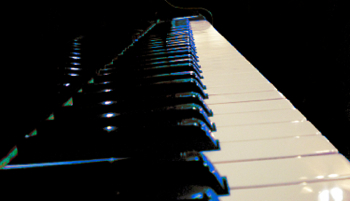
Any place where wood and metal meet can cause problems with humidity swings. For instance, during periods of high humidity, wooden parts such as flanges will take on moisture and will try expand against a metal screw. Since the metal won't budge, the wood fibers begin to compress. When the humidity goes back down, the now compressed wood fibers shrink away from the screw and leaving a small gap between the wood and the screw. Repeated cycles of compression and release can cause loose flanges, which in turn can lead to many problems such as clicking notes, misaligned hammers, etc.
Too much moisture can cause the strings to rust. Here is a piano I recently serviced:
 |
The strings have begun to rust into place. Notice that three strings have already been replaced (a single string goes up and loops back down) and the replaced string on the left has already begun to rust. There is also a string missing. This piano could use a complete restringing as well as a thorough cleaning!


